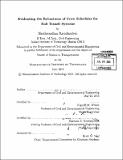| dc.contributor.advisor | Nigel H.M. Wilson and Harilaos N. Koutsopoulos. | en_US |
| dc.contributor.author | Ravichandran, Harshavardhan | en_US |
| dc.contributor.other | Massachusetts Institute of Technology. Department of Civil and Environmental Engineering. | en_US |
| dc.date.accessioned | 2013-12-06T20:49:01Z | |
| dc.date.available | 2013-12-06T20:49:01Z | |
| dc.date.issued | 2013 | en_US |
| dc.identifier.uri | http://hdl.handle.net/1721.1/82849 | |
| dc.description | Thesis (S.M. in Transportation)--Massachusetts Institute of Technology, Department of Civil and Environmental Engineering, 2013. | en_US |
| dc.description | Cataloged from PDF version of thesis. | en_US |
| dc.description | Includes bibliographical references (pages 145-146). | en_US |
| dc.description.abstract | Crew scheduling has traditionally been the last step in the process of service planning, and it has traditionally aimed at minimizing manpower costs because it was assumed that the crew schedule does not directly impact service quality. There has been a growing recognition that crew schedules do in fact affect performance, especially during disruptions, and in that context different crew schedules perform differently. The primary objective of this research is to evaluate the robustness of a crew schedule, or in other words, the performance of a crew schedule under a range of commonly observed disrupted conditions. While the thesis focuses on the Piccadilly Line on the London Underground, the concepts and methods developed are intended to be applicable to a range of metro lines and systems. The thesis has four components: first, a description of the types of incidents that take place on a line, the type of service control interventions used to respond to incidents, and the intimate relationship between the crew schedule and service control policies; second, a comparative analysis of the structure of two Piccadilly Line crew schedules to demonstrate how two crew schedules with similar underlying timetables can have very different structures, and how those structural differences can affect performance; third, the development of a simulation-based framework for evaluating the robustness of crew schedules, and a simulation model of the Piccadilly Line; and finally, the application of the simulation model to evaluate and compare the performance of the same two Piccadilly Line crew schedules under a range of disrupted conditions. Based on observation and understanding the relationship between the crew schedule and service control, a service control module has been implemented in the simulation. This module mimics the actions of a service controller when the operations plan is disrupted and is a key contribution of this research. This allows for the simulation of incidents on the line which leads to an understanding of how the structure of a crew schedule affects its performance during disruptions. Elements of a crew schedule such as slack time and relief locations are identified as key drivers of robustness. The effect of these elements on performance is demonstrated by comparing the simulated performance of two crew schedules that differ in the distribution of these elements. The simulation also allows the testing of hypothetical crew schedules, such as those corresponding to different labour agreements. Therefore, it can be used to test the performance impact of changes in labour agreements. This is demonstrated for the case of the Piccadilly Line through the simulation of two hypothetical scenarios where two different labour constraints are relaxed. The thesis concludes with recommendations to Piccadilly Line and London Underground management and staff regarding crew scheduling, service control and data collection. Results suggest that the slack time in Piccadilly Line crew schedules could be redistributed in a way that improves performance by relaxing other constraints, and that service controllers currently make control decisions without easy access to critical crew information and control decisions could be improved by providing them with better information on crew activities. | en_US |
| dc.description.statementofresponsibility | by Harshavardhan Ravichandran. | en_US |
| dc.format.extent | 146 pages | en_US |
| dc.language.iso | eng | en_US |
| dc.publisher | Massachusetts Institute of Technology | en_US |
| dc.rights | M.I.T. theses are protected by
copyright. They may be viewed from this source for any purpose, but
reproduction or distribution in any format is prohibited without written
permission. See provided URL for inquiries about permission. | en_US |
| dc.rights.uri | http://dspace.mit.edu/handle/1721.1/7582 | en_US |
| dc.subject | Civil and Environmental Engineering. | en_US |
| dc.title | Evaluating the robustness of crew schedules for rail transit systems | en_US |
| dc.type | Thesis | en_US |
| dc.description.degree | S.M.in Transportation | en_US |
| dc.contributor.department | Massachusetts Institute of Technology. Department of Civil and Environmental Engineering | |
| dc.identifier.oclc | 863232981 | en_US |
